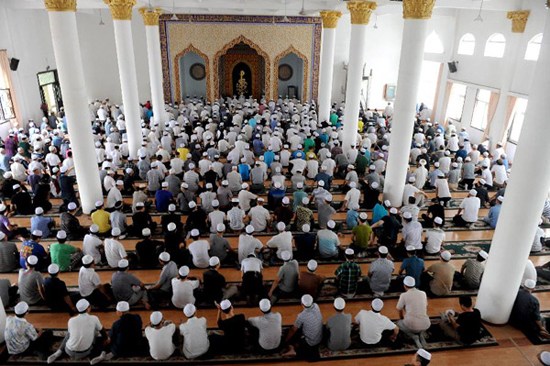
Muslims gather in Zhengzhou Mosque to take part in the ceremony of Eid-Al-Fitr in Zhengzhou, capital of central China's Henan Province, Aug. 19, 2012. Eid-Al-Fitr marks the end of the Muslim holy month of Ramadhan. (Photo: Xinhua)
Muslims across China on Sunday celebrated Eid al-Fitr, which marks the end of the Muslim holy month of Ramadan, a season of fasting and spiritual reflection.
In northwest China's Xinjiang Uygur Autonomous Region, tens of thousands of Muslims of various ethnic minorities, including Uygur, Hui, and Kazakh, could hear imams preaching in the capital of Urumqi as the first rays of sunlight appeared.
The Sunday morning prayer service on Eid al-Fitr, the fast-breaking festival, is one of the most important prayer ceremonies Muslims attend each year.
"Ramadan is the most auspicious month of the year, and Eid al-Fitr is like New Year's for us Muslims," said Ma Yucheng.
He came to Khan Tengri Mosque in Urumqi at 6:30 a.m. in order to secure a good seat for the prayer ceremony.
After the communal prayer, the 34-year-old man, like most of his fellow Muslims, visited a local cemetery to honor his deceased relatives. Muslims sweep and clean the tombs of their deceased relatives and leave food offerings before returning home for family gatherings.
Ma said his family has spent the past week preparing for Eid al-Fitr, amassing all sorts of delicacies, including fried sweets, nuts, fresh fruits, bread and freshly butchered sheep. His family will enjoy a feast to mark the first meal eaten during daylight in a month.
On Sunday, Urumqi's public transport group added several temporary lines for the convenience of Muslims traveling to mosques and cemeteries.
The local government declared Eid al-Fitr a three-day public holiday to give Muslim residents enough time to attend religious services and visit relatives.
For Li Xuejun, imam at the Hebayan Mosque in Urumqi, the three-day holiday will be exceptionally busy, as he hopes to visit elderly, disabled and sick Muslims in his community, bringing them gifts and reciting the Quran for them.
"My priority now is to make sure all Muslims in the community enjoy a proper festival," said Li.
The mosque in the old Silk Road city of Kashgar, the largest of its kind in China, saw nearly 5,000 Muslims attend the morning prayer service.
Xinjiang has a population of more than 21 million, and more than half of them are Muslims from 10 ethnic groups, such as Uygur, Kirgiz, Kazak and Uzbek. The region is home to a total of 24,000 mosques.
During Ramadan, the ninth month of the year on the Muslim calendar, Muslims refrain from eating, drinking, smoking and sex from sunrise to sunset, in an effort to show their devotion to their faith. Children, the elderly and the sick do not have to fast.
Ramadan started on July 20 this year. Mosques, including the White Mosque, have received a higher number of visitors than usual, half of the visitors were part of a floating population that travels during Ramadan.
These mosques organized Muslims to take turns keeping watch at the door to ensure that visitors could come and go safely.
When Muslims occupied roads and disrupted traffic while attending prayer services, Imam Abdushukur at the White Mosque helped resume traffic order by saying, "The prayers of those who pray on road will be rendered invalid."
Ramadan passed peacefully and harmoniously, with residents of different ethnic backgrounds praying and sharing in Suhoor, pre-fasting meals eaten before dawn, said Liu Zhenqiang, director of the regional ethnic affairs committee.
Meanwhile, in Ningxia Hui Autonomous Region and other Muslim-populated regions, Muslims donned festive outfits and crowded into local mosques.
The regional government of Ningxia, one of the country's major Muslim-populated regions, extended the public holiday from Saturday to Tuesday this year, giving Muslims four days to enjoy the festival.
Ningxia is home to about 10 percent of the country's 20 million Muslims, half of whom are from the Hui ethnic group.
Due to different religious sects, northwest China's Qinghai Province started the festival on Saturday, while other Muslim-populated regions, including Xinjiang and Ningxia, celebrated the festival on Sunday.
The Islamic Association of China held a tea party on Sunday at the Great Hall of the People in Beijing to celebrate the end of Ramadan. The activity was also an event to show respect for the elderly.
Vice Premier Hui Liangyu attended the tea party.

Copyright ©1999-2011 Chinanews.com. All rights reserved.
Reproduction in whole or in part without permission is prohibited.